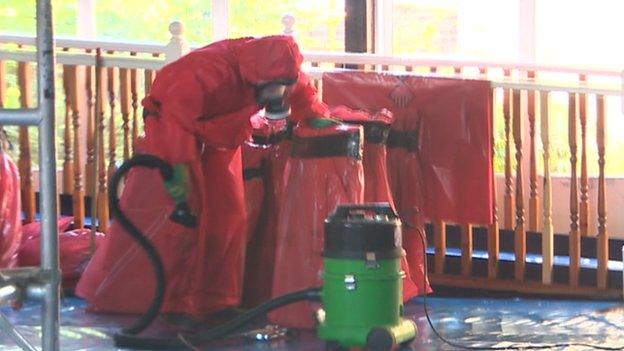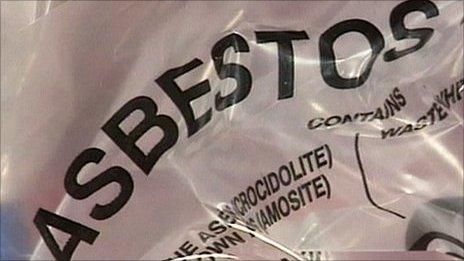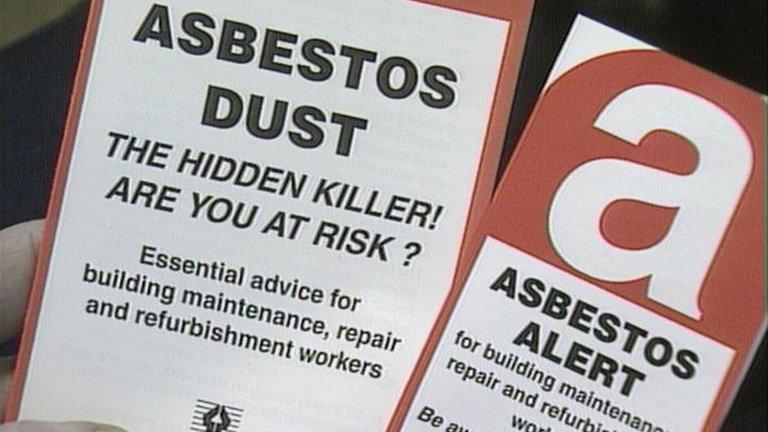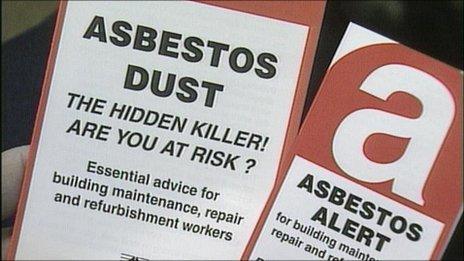Take lead on asbestos in schools, Welsh government told
- Published

Lawyer Cenric Clement-Evans is calling on politicians to take responsibility
Campaigners are calling on the Welsh government to take more of a lead in addressing asbestos in schools.
Asbestos was widely used in the building industry in the 1960s and 70s but was banned in the UK in the 1990s.
Lawyer Cenric Clement-Evans told BBC Wales he wanted the government to set up an advisory group and create a Wales-wide policy.
The Welsh government and UK government have disagreed over whether the matter is devolved.
Asbestos was banned in the UK in 1999, after a link was established to lung diseases including mesothelioma.
In England, the government published a similar policy in March this year, but there is uncertainty over who has responsibility in Wales.

There were 1,514 schools in Wales containing asbestos in 2012
Mr Clement-Evans, a lawyer from the Right to Know: Asbestos in Schools Wales campaign, said: "I don't care who takes responsibility, I want somebody to take responsibility.
"This is too important to get embroiled in some form of party politics or some big issues between the Welsh government and the UK government.
"I think that the way is fairly straightforward, not the managing of the issue but the putting together of a steering group, deciding policy.
"I don't think it's difficult to start that ball rolling."
Between 2003 and 2012, 224 people in Britain whose last occupation was recorded as "teaching professional" died of mesothelioma.
The rate of deaths is rising, but only in line with overall mesothelioma deaths, which amounted to 21,957 during this same period.
One of those was Gwyneth Bonnet.
She was a college lecturer and teacher in Llangefni, Anglesey, in the 1990s and thought she came into contact with asbestos at Coleg Menai's old Pencraig college campus.
Asbestos is being removed from Ysgol Gymraeg Cwmbran, Torfaen
She died at her home in January after a battle against the asbestos-related disease malignant mesothelioma.
The coroner at the inquest into her death concluded that Mrs Bonnet died from an industrial disease and said evidence indicated the exposure to asbestos would have occurred during her time at Pencraig.
Her husband Tom, the Vicar of Caerhun, near Conwy, told BBC Wales the last months of her life were "hell" and that he is moving away from the area to be closer to his daughter.
"I'm devastated. I'm absolutely devastated. I'm giving up everything now," he said.
"I'm leaving this lovely place, this lovely parish and lovely people because I can't carry on.
"I came here with my wife, we loved it together, we planned it together, she did everything in this place."

Asbestos is being removed from Ysgol Gymraeg Cwmbran, Torfaen
A spokesman for Coleg Menai said Mrs Bonnet's death was a "great loss" to the college and that it would not be appropriate to comment while legal proceedings are ongoing.
He added that Coleg Menai took the safety of staff and students "very seriously" and conforms to all legal requirements.
A Welsh government spokesperson said the Health and Safety Executive was responsible for enforcing health and safety law.
He added: "We also published our own advice and guidance in May 2014. However, responsibility for the management of asbestos lies with the duty holder and in the school premises context, this can either be the local authority or the school governing body."
Lifetime risk
In 2012, BBC Wales' Week in Week Out programme revealed there were 1,514 schools in Wales containing asbestos - in other words 85% of Welsh schools.
Symptoms of the cancer generally take 30 to 40 years to develop. Once diagnosed, most people can expect to live between just 12 and 21 months.
There are no statistics to suggest how many people might have developed mesothelioma due to asbestos exposure as a pupil.
But the UK government's Committee on Carcinogenicity suggests a child first exposed to asbestos aged five has a lifetime risk of developing the cancer about five times greater than that of an adult first exposed aged 30.

What is mesothelioma?
A type of cancer which can develop in the tissues covering the lungs or the abdomen
Symptoms do not usually appear in the early stages but include chest pain, shortness of breath, tiredness, coughing, changes to voice and difficulty swallowing
Asbestos is known to cause most cases of mesothelioma in the chest
Source: NHS UK
- Published17 October 2012

- Published17 May 2012

- Published28 March 2012
